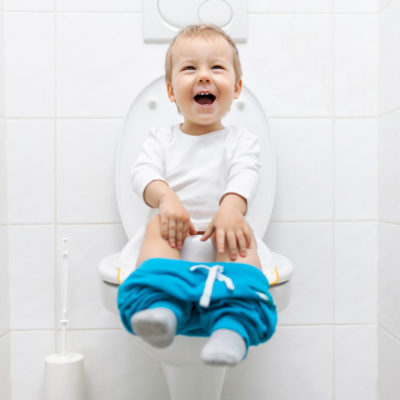
Potty Training Tips & Advice
Potty training is one of the major developmental milestones that every healthy child must learn. It can be a daunting task for some parents, but also a very rewarding time for the child. I hope to give some helpful tips below that help with potty training success, which I learned from the Guide to Toilet Training book and healthychildren.org, both from the American Academy of Pediatrics.
Simple Potty Training Tips to Implement
The first step to potty training success is making sure that your child is ready to toilet train. Children do not have control over their bowel or bladder prior to 1 year of age. Most children will be ready to start potty training around 18 to 24 months, but some may not be ready until 3 years old. Your child may be ready to potty train if he or she can:
- Tell you when he or she needs to urinate or have a bowel movement.
- Remain dry for at least two hours at a time during the day.
- Tell you when he or she has a soiled diaper and asks you to change it.
Times to avoid potty training include when your family is planning to move, you are expecting a new baby, your child is sick, or there has been illness or a crisis in the family.
The next step is then to choose your method of potty training. Some people choose a short, intense period of time to focus on potty training while others reinforce the learning over a few months. There is no right answer when it comes to choosing the method, just choose what works best for your family! Choose whether to use a small potty chair or an adult toilet with a child seat on it. Again, whatever works best for you and your child. It can be fun for your child to go to the store and buy the smaller potty chair, which may encourage his interest in training. It’s important to explain what is happening to the child in a way that he can understand and model the behavior for him.
Makes scheduled trips to the potty and be consistent. Be encouraging when he is successful and supportive when he is not. For instance, say “great job” when doing well with voiding/stooling in the potty or “we will try again next time” if he’s not successful. It is important to stay positive. You should not scold or punish your child for mistakes with potty training. If your child becomes frustrated or resistant to using the potty, you may have to take a break from training and come back to it in a few weeks. If the potty training becomes a power struggle between parent and child, the process will be exceedingly frustrating. Always teach your child to wash her hands after using the toilet, and make sure to model the behavior for her. Watch for potential problems, i.e. automatic flushing toilets can sometimes scare small children.
Finally, remember that children will usually be fully potty trained during the day before they are able to stay dry at night. Don’t worry about this because most children are fully potty trained when their bladder is more mature (between 5 and 7 years old). If you have concerns, contact your pediatrician. Some reasons to call include potty training failure after trying the above methods for at least six months, your child is holding stone has become constipated, or your child refuses to sit on the potty.
– Dr. Kimberly Coker

